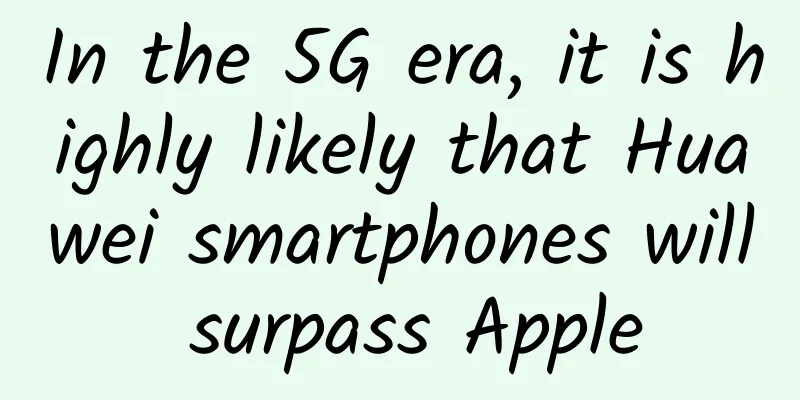In the 5G era, it is highly likely that Huawei smartphones will surpass Apple

|
Having just experienced the "hardware-free" press conference in Apple's history, Apple fans have suffered a new blow: due to the "difficulties" of Samsung and Qualcomm, Apple may not be able to buy baseband chips in the near future, and the iPhone may continue to be absent from the 5G era. Apple frequently cuts prices Since the second half of 2018, Apple has encountered problems in market sales. The Q1 financial report released not long ago showed that the overall revenue fell by 5% compared with the same period last year, and the Greater China region even fell by 26%. CEO Cook's response to this is to frequently introduce price cuts, hoping to use price cuts to restore consumers' confidence in Apple. The frequent price cuts for iPhone phones began at the end of 2018 and there is still no sign of stopping. In December 2018, Apple China’s official website launched a trade-in campaign, where users could trade in their old Apple phones for new iPhone XR and iPhone XS models. The campaign was supposed to end on January 31, 2019, but Apple later extended the campaign deadline to March 25. In January 2019, Apple once again drastically cut iPhone prices on JD.com, Tmall and Suning. After the price adjustment, the prices of iPhone XR, iPhone 8/8P were up to 1,200 yuan lower than the prices on Apple's official website. On March 5, 2019, Suning Mobile's official blog announced that the price of iPhoneXS had begun to drop. Subsequently, JD.com and Suning.com's Tmall flagship store also announced price adjustments for the iPhone XS series. After the adjustment, the prices of iPhone XS 64G and 256G on Tmall Suning.com flagship store were 7,299 yuan and 8,699 yuan respectively; iPhone 8 64G was less than 4,000 yuan. On JD.com, the price of iPhone XSMax was as low as 7,999 yuan, and the price of iPhone XS started at 7,399 yuan. Recently, news from all links of the industry chain revealed that Apple is about to make another major adjustment to its product line, with the core goal of streamlining the price of "entry-level" models. All models including the iPhone 6S and earlier will be eliminated, leaving only the 128G memory version of the iPhone 7 as an entry-level model to compete with many domestic brands for the mid-range market. In order to maintain competitiveness and quickly increase overall revenue, Apple is rumored to set the price of iPhone 7 below 3,500 yuan! The reason for this pricing is simple: domestic brands are the most aggressive and are eating into Apple's market share the most in the 4,000 yuan price range. If Apple wants to gain a foothold and fight back, it must first take the iPhone 7, Apple's entry-level model, as a pioneer and "fight" at a lower price. Apple has gone from “never having anything to do with price cuts” in the past to now frequently cutting prices and fully participating in the “price war”. Apple is really anxious because of its poor sales. Apple's 5G is in trouble Recently, according to foreign media reports, Apple has encountered a series of setbacks in the process of purchasing 5G chips from Qualcomm and Samsung, and seems to have encountered the dilemma of no 5G chips available. After the media widely reported on Apple's 5G chip dilemma, Qualcomm issued a statement saying that Apple "has our phone number" and if they want to buy Qualcomm 5G chips, "they just need to call us." This seemingly generous statement actually embarrassed Apple. Everyone knows that Apple, Qualcomm and Samsung have been in constant conflict for many years, especially with Qualcomm. In 2018, the two sides also sued each other over patent issues. Qualcomm even applied to the Chinese court to take "sale ban" measures on Apple's iPhone 8, iPhone X and other products. There is no sign of reconciliation between the two companies so far. At a time when Apple is facing difficulties, can Qualcomm provide Apple with timely assistance? Even if it can barely supply products, can Apple gain corresponding advantages in price and other aspects? Will Apple eat this "beggar's food" handed over by Qualcomm? In addition to the conflict between Qualcomm, Samsung and Apple, another important reason for Apple's 5G baseband chip difficulties is Intel's incompetence. Previously, after Apple had a disagreement with Qualcomm and Samsung, it turned to Intel for its 5G chips. As a leader in the chip industry, Intel should be able to help Apple a lot. But what makes Apple feel helpless is that Intel is not good at communication baseband chips! - Intel originally had a very strong baseband chip R&D department, but the department was sold in 2006. In 2010, seeing the increasingly promising development of the mobile communication market, Intel regretted it and spent a huge amount of money to acquire the wireless solution department of Infineon Technologies of Germany and re-established its own baseband chip R&D line. After all this trouble, Intel has fallen far behind Qualcomm in the field of communication technology. In 2018, Apple began to use Intel's 4G baseband chips on the iPhone XS and XS Max models. However, the effect of this cooperation was not good. Many consumers complained about Apple's new phones' "poor signal and poor call quality". The industry attributed these problems to two points: one was that Apple's own communication antenna was not well designed, and the other was that Intel's communication baseband chip had poor performance. After these problems occurred, Apple was no longer willing to cooperate with Intel. It was only after entering the 5G era that Apple had to seek cooperation from Intel again because it repeatedly ran into obstacles in front of Qualcomm and Samsung. Although Apple is willing to "lower its status" to support Intel, the latter still has big problems in the research and development capabilities of communication technology. In order to meet Apple's needs, Intel once developed the first generation of 5G chip - XMM 8060, but in a series of tests by Apple, this chip failed to meet the standards and was rejected by Apple. Intel had to increase investment in the urgent development of the second-generation product XMM 8160 5G. According to Apple's requirements, the second-generation product must be further improved in terms of energy consumption, heat generation, and connection stability. Can Intel launch a chip that meets Apple's requirements? Only they know. But what is certain is that it is impossible to do so in 2019 - according to Intel's new statement, we know that the XMM 8160 5G chip required by Apple will not be put into mass production until 2020 at the earliest. Apple’s 5G chip dilemma seems to have no solution in the short term. In the 5G era, it is highly likely that Huawei will surpass Apple In the smartphone industry, the most notable thing in the past two years is Apple's sluggish growth and Huawei's rapid rise. Throughout 2018, Huawei's smartphone business showed a trend of substantial growth. In the key Chinese market, Apple's sales in the fourth quarter of 2018 fell 20% from the same period last year, while Huawei's mobile phone shipments achieved a year-on-year growth of 23% in the same quarter, and the trend of one rising and the other falling is becoming more and more obvious. Globally, Huawei's mobile phone shipments in 2018 were only about 30 million units less than Apple. Considering Huawei's overall shipments of more than 200 million units, it can be seen that Huawei is very close to surpassing Apple. The reason why Huawei can achieve such a huge leap in sales is that it continues to make innovative breakthroughs in hardware, which makes it increasingly attractive to consumers. Not long ago, Richard Yu, head of Huawei's mobile phone division, commented on Apple's "full shift to services" and said: "Apple is no longer as good as Huawei in terms of hardware." He also believed that the reason why Apple was eager to shift to software and services was that "Apple's hardware lacked innovation and had to take the risk of entering the service market." If Yu Chengdong had said this a year ago, he would have been met with sneers and ridicule. But with the release of 2018 data, no one in the mobile phone industry dares to underestimate Huawei's hardware innovation capabilities. First of all, from the perspective of screen technology and appearance design, Apple has not launched innovative designs for more than three consecutive years. While domestic brands, including Huawei, are increasingly turning to water drop screens and even hole-punch screens, Apple is still using the same old bangs screen. In terms of photography, Huawei has established a brand image of "photography" in the minds of consumers through technologies such as Leica lenses, AI applications, and 50x zoom. Huawei is already an industry leader in battery and charging technology, but Apple’s AirPower wireless charging technology was delayed at its spring launch, which not only disappointed consumers but also further reinforced the impression in the industry that it is weak in research and development. At the first world-class wireless communications exhibition this year, MWC 2019 in Barcelona, Huawei became the focus of global attention with its innovative 5G + folding screen technology. On the other hand, Apple not only made no achievements in the new trend of folding screens, but also repeatedly missed 5G communications. Looking back at what has happened in the past year, Yu Chengdong's statement that "Apple is no longer as good as Huawei in hardware" is not just empty talk. In terms of hardware innovation, Apple is indeed no longer as good as Huawei phones in some aspects. If Huawei has begun to surpass Apple in terms of mobile phone hardware, then Huawei is even ahead of Apple in the key 5G communication technology. As we all know, Huawei is one of the world's leading companies in the field of wireless communications. In the emerging 5G era, Huawei has full-chain technical advantages from telecommunications equipment to mobile terminals. According to a report released by patent data company IPlytics, among the world's major communications companies, Huawei ranks first in the world in the 5G standard technology contribution ranking. In 2018, Huawei released the industry's end-to-end full range of 5G commercial products and solutions based on 3GPP standards, and has conducted 5G tests with 182 operators around the world. In 2018, Huawei signed more than 30 5G commercial contracts and shipped more than 40,000 5G base stations around the world. Recently, Huawei was also elected as the chairman of the plenary meeting of the global 5G standards association 3GPP SA, further consolidating its voice in the field of 5G communication technology. What is more noteworthy is that the 5G baseband chip "Balong 5000" for smartphones released by Huawei last year significantly surpassed Samsung's similar product "Exynos 5100" in terms of transmission speed and connection stability. This shows that Huawei has left other mobile phone manufacturers including Samsung and Apple behind in 5G communication technology. At the same time, Huawei has also launched an IoT system based on the HiLink protocol, which has technically formed comprehensive coverage of indoor and outdoor 5G environments, and is extremely attractive to consumers and corporate users. Compared with Huawei, Apple is completely at a disadvantage in the field of 5G communication technology. Huawei can use its core technology advantages to build a complete application system and even guide the technology trend of smartphones in the 5G era, while Apple can only rely on industry chain partners to provide key baseband chips and other components. Apple, which lacks hardware technology innovation capabilities, will appear more passive in the competition after entering the 5G era. As 5G commercial networks are gradually put into practical use around the world, Apple, which lacks 5G technology, is falling into a more difficult situation. With its partner Intel being unreliable in terms of technology, and Samsung and Qualcomm unwilling to lend a helping hand, Apple's new products are destined to lag behind its competitors by a quarter or even more than half a year. It is foreseeable that in the 5G era, a large number of originally loyal consumers will gradually turn away from Apple, which is increasingly lagging behind, and turn to other brands. In this 5G era where speed determines everything, Apple, which is a step behind, will most likely be surpassed by Huawei. |
Recommend
A practical course on color business that goes beyond teaching matching
A practical course on color business that teaches ...
Stay tuned! What should you do if you are assaulted or sexually harassed? You must know these things
Expert of this article: Zhu Guangsi, science writ...
LeEco's car manufacturing relies on courage alone.
Recently, LeTV’s car manufacturing has made headl...
Game live streaming platform: Huya Live Development Analysis
The author of this article analyzes the main func...
I don't want to use a watered-down iPhone 6.
The Apple conference to be held on September 9th ...
Only 3 steps to complete practical and effective competitive product analysis
This article mainly goes over with you how to eff...
Beware! Don’t touch this kind of “milk tea cup”
Recently, there has been a Outer packaging Toys s...
A brief analysis of precise audience targeting in Internet advertising!
With the development of Internet advertising tech...
Download Feng Qingyang's Stock Market Practice Course 1 from Baidu Cloud
Feng Qingyang's Stock Market Practice Course ...
Salute! The breakthroughs in oil extraction technology have made the country more and more confident.
How many steps are there to extract oil? Find it,...
All the creative routines for high-click information flow in the 4 major industries are here!
As we all know, due to its own industry attribute...
The other side of the layoff wave: Don’t want to “roll” anymore, want to be “N+1”
Yuan Dian clearly remembers that the number of pe...
The boy who started the fantasy journey is a beggar eel? !
Searching for flower eels - Environmental DNA eco...
What does the new edible battery taste like? Crunchy chicken?
Audit Expert: Wang Jinlu, Power R&D Director,...









